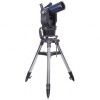Meade ETX-90 User Manual - Page 32
Advanced Features
 |
View all Meade ETX-90 manuals
Add to My Manuals
Save this manual to your list of manuals |
Page 32 highlights
ADVANCED FEATURES 32 Advanced AutoStar Adding Observing Sites If you plan to observe using AutoStar at different geographic locations, you can store up to six observation sites in AutoStar's memory to help simplify your telescope setup. Perform these procedures using the Site options (Add, Select, Delete, Edit) of the Setup menu. To Add a Site to the user-defined site list: Features observing sites list. Choosing a site already on the list (as opposed to using the "Custom" feature) makes it easier to edit, as the "Time Zone" value may not need to be changed. 2. Scroll to "Site: Edit" and press ENTER. "Edit: Name" displays. Press ENTER. 3. The name of the site you have just entered to your list displays; if it does not, scroll to the site. In this example, you will choose a city and add it to the database list. You will then select the site to enable it. 1. Navigate to the "Setup: Site" menu. Press ENTER, 2. Scroll through the options until "Site: Add" displays. Press ENTER. 3. You are given a choice to enter a zip code (press "1") or select a city from the list (press "2"). If you choose "Zip", enter the digits of your zip code and press ENTER. 4. If you choose "City", scroll through the list of countries/states. Press ENTER when the country/state you wish to add displays. 5. Scroll through the list of cities. Press ENTER when the city you wish to select displays. The sites you choose will appear at the top of the Select list (all other available sites will be listed after the sites you have chosen). 6. To choose a site, navigate to "Site: Select". Press ENTER. Scroll through the list of sites. Both Zip Codes and Cities are displayed. When the desired zip code or site displays, press ENTER. To Edit a Site: In this procedure, you will enter a location that is not available in the AutoStar database by editing data of a nearby site. You will edit the location's name, latitude, longitude and the time zone shift. You will then select the site to enable it. 4. Using the Arrow keys, change the name of the site so that it now reads the name of your observing location. Press Enter. "Edit: Name" displays again. 5. Press the Scroll Down key and "Edit: Latitude" displays. Press ENTER. 6. Using the Number Keys, enter the latitude of your observing site and then press ENTER. "Edit: Latitude" displays again. 7. Press the Scroll Down key and "Edit: Longitude" displays. Press ENTER. 8. Using the Number Keys, enter the longitude of your observing site and then press ENTER. "Edit: Longitude" displays again. 9. Press the Scroll Down key and "Edit: Time Zone" displays. Press ENTER. (If the site you chose from the list in step 1 has the same Time Zone as the site you are editing, Time Zone Atlantic Eastern Central Mountain Pacific Alaska Hawaii Shift -4 Hours -5 Hours -6 Hours -7 Hours -8 Hours -9 Hours -10 Hours just press ENTER again to go on to the next step.) "Time Zone" refers to the Greenwich Time Zone shift. Users West of Greenwich, use "-" hours (one hour per time zone) and users East of Greenwich use "+" hours. For the United States, look up the shift in Table 1, at the left. 10. After entering the shift, press ENTER. "Edit Time Zone" displays. You will need to know the latitude and longitude of your location to perform this procedure. This information is available on most maps. 1. Using the Add option, choose a site on the list that is closest to your observing site and press ENTER so that the site is added to your 11. Press MODE. "Site: Edit" displays. 12. Using the Arrow keys, scroll to "Site: Select". The site you have just edited displays. Press ENTER to select the site or press MODE to exit.















